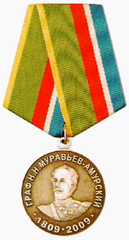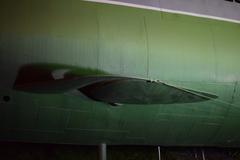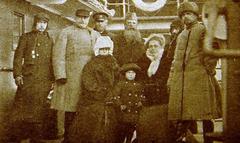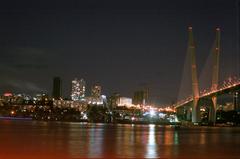Visiting the Monument of Lazo in Vladivostok, Russia: Guide, Tickets, Hours, and Tips
Date: 14/06/2025
Introduction: History and Significance
The Monument of Lazo in Vladivostok is a striking testament to the city’s revolutionary heritage and its pivotal role during the Russian Civil War. Standing on Svetlanskaya Street, this bronze statue honors Sergei Georgiyevich Lazo—a nobleman-turned-Bolshevik who became a martyr and symbol of Soviet heroism in the Russian Far East. The monument, designed in the heroic realism style by L. Pisarevsky, not only commemorates Lazo’s leadership and tragic fate but also serves as a central landmark within Vladivostok’s urban and cultural landscape.
Open year-round with no admission fee, the monument is easily accessible and located near key attractions such as the Fortress of Vladivostok, the Gorky Theater, and the Golden Horn Bay. This guide offers comprehensive information on visiting hours, accessibility, guided tours, and practical tips to help you make the most of your visit. For further historical context, see the Sergei Lazo Wikipedia page, the Fortress of Vladivostok official site, and Russia’s Revolutionary Sources and Legends.
Contents
- Introduction
- Sergei Lazo: Historical Background
- About the Monument
- Location and Accessibility
- Visiting Hours and Tickets
- Facilities
- Historical and Artistic Significance
- Design and Symbolism
- Replacement of the Zavoiko Monument
- Visitor Experience and Practical Tips
- Accessibility
- Best Time to Visit
- Photography and Etiquette
- Transportation
- Nearby Attractions
- Preservation and Contemporary Relevance
- Frequently Asked Questions (FAQ)
- Visuals and Media
- Recommendations and Conclusion
- Sources
Sergei Lazo: Historical Background
Sergei Lazo (1894–1920) was born into Moldovan nobility but joined the Bolshevik cause in 1917. As a Red Army leader, he played a significant role in the Far Eastern campaigns against the White Army and foreign interventionists. His capture and mysterious death in 1920—according to Soviet accounts, burned alive in a locomotive firebox—cemented his status as a revolutionary hero and symbol of resistance (Sergei Lazo - Wikipedia).
About the Monument
Location and Accessibility
The Monument of Lazo is centrally located on Svetlanskaya Street, a historic and bustling artery in Vladivostok. The area is pedestrian-friendly and well-served by public transport, making it easy to integrate into a city walking tour. The statue’s position near the Gorky Theater and Central Square places it at the heart of Vladivostok’s historical and cultural activity (vladivostok.travel).
Visiting Hours and Tickets
- Open: 24/7 (outdoors in a public square)
- Admission: Free
Facilities
- Accessibility: Paved paths and flat terrain make the site accessible for most visitors, including those with limited mobility.
- Information: Multilingual plaques explain the monument’s context.
- Nearby Amenities: Cafes, shops, and public restrooms are available in the surrounding area.
Historical and Artistic Significance
Design and Symbolism
Created in 1975 by sculptor L. Pisarevsky, the monument is cast in bronze and mounted on a granite pedestal. Lazo is depicted in military attire, exuding determination and resilience. The statue’s realism and commanding posture are characteristic of Soviet monumental art, symbolizing both individual sacrifice and collective ideals (ntserver1.wsulibs.wsu.edu).
Replacement of the Zavoiko Monument
The Lazo statue replaced a monument to Admiral Vasily Zavoiko, reflecting the Soviet practice of reinterpreting public spaces to emphasize revolutionary over imperial figures. This change highlights evolving narratives in Vladivostok’s civic memory (ntserver1.wsulibs.wsu.edu).
Visitor Experience and Practical Tips
Accessibility
The monument is open and accessible at all hours. The surrounding area is safe and well-trafficked, but care should be taken in winter due to icy conditions (hikersbay.com).
Best Time to Visit
The most pleasant months are June to September, when the weather is mild. Winters can be harsh, so dress accordingly if visiting during colder months.
Photography and Etiquette
Photography is welcome, with the best lighting in the early morning and late afternoon. During commemorative events, please be respectful and unobtrusive.
Transportation
Easily reached by bus, tram, taxi, or on foot from the city center. Limited parking is available nearby; public transport or walking is recommended (2vladivostok.ru).
Nearby Attractions
- Fortress of Vladivostok: Explore military fortifications and history (Fortress of Vladivostok Official Site).
- Eagle’s Nest Hill: Offers panoramic city views.
- Central Square: A hub of civic life and cultural events.
- Vladivostok Railway Station: The terminus of the Trans-Siberian Railway.
- Golden Horn Bay and Zolotoy Rog Bridge: Iconic waterfront sights.
- Vladivostok Submarine Museum: Tour a decommissioned Soviet submarine.
- Russky Island and Primorsky Aquarium: Nature, beaches, and marine exhibits (WildTrips Vladivostok Guide).
Preservation and Contemporary Relevance
The Monument of Lazo is maintained by city authorities and remains a prominent fixture in Vladivostok’s landscape. While some debate exists about restoring the original Zavoiko monument, the Lazo statue’s endurance reflects the city’s layered approach to memory and identity (ntserver1.wsulibs.wsu.edu).
Frequently Asked Questions (FAQ)
Q: What are the visiting hours?
A: The monument is accessible 24/7.
Q: Is there an entrance fee?
A: No, the site is free to visit.
Q: Are guided tours available?
A: Yes, many city tours include the monument.
Q: Is it accessible for visitors with disabilities?
A: Yes, though some nearby terrain may be uneven.
Q: When is the best time to visit?
A: June to September offers the best weather.
Q: Can I take photographs?
A: Yes, photography is encouraged.
Visuals and Media
For an enhanced experience, seek out images and virtual tours of the monument. Use alt text such as “Monument of Lazo Vladivostok” and “Sergei Lazo bronze statue” for accessibility and SEO.
Recommendations and Conclusion
- Combine your visit to the Monument of Lazo with other nearby historical and cultural sites for a richer understanding of Vladivostok’s heritage.
- Use guided tours or audio apps like Audiala for deeper historical context.
- Check local event listings for commemorations or festivals during your stay.
- Try local cuisine and learn a few Russian phrases for a more immersive experience.
The Monument of Lazo is not only a memorial to a revolutionary hero but also a vibrant part of Vladivostok’s living history. Its artistic grandeur, strategic location, and ongoing relevance make it an essential stop for anyone exploring the city’s unique past and present.
For more information and travel planning, consult the Fortress of Vladivostok official website, Russia’s Revolutionary Sources and Legends, and Sergei Lazo’s Wikipedia page.
Sources
- Sergei Lazo - Wikipedia
- Fortress of Vladivostok Official Site
- Russia’s Revolutionary Sources and Legends
- ntserver1.wsulibs.wsu.edu
- vladivostok.travel
- 2vladivostok.ru
- hikersbay.com
- WildTrips Vladivostok Guide
- Against the Compass Russia Guide
- Penguin Travel Russia Guide
- globalurban.org



